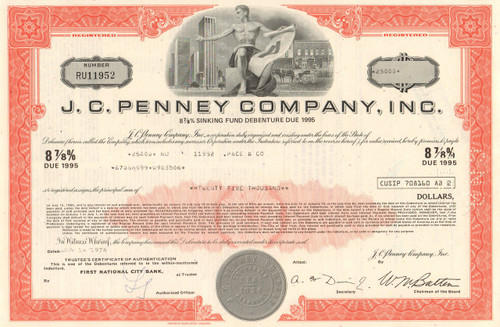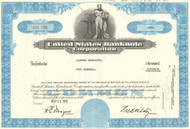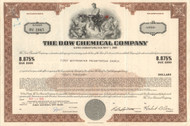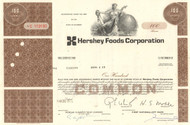Categories
Categories
- Home
- General
- General 1950-present
- J. C. Penney certificate 1970's (retail chain)
J. C. Penney certificate 1970's (retail chain)
Product Description
J. C. Penney bond certificate 1970's (retail chain)
Cool retail collectible. Nice vignette of a classical male figure holding a scroll in front of modern city scene and an old Golden Rule Store with a horse-drawn wagon. Issued and cancelled. Dated 1970's.
James Cash Penney was born in Hamilton, Missouri. After graduating from high school, Penney worked for a local retailer. He relocated to Colorado at the advice of a doctor, hoping that a better climate would improve his health. In 1898, Penney went to work for Tyler and Guy Johnson, who owned dry goods stores called Golden Rule stores in Colorado and Wyoming. In 1899, Callahan sent Penney to Evanston, Wyoming, to work with Johnson in another Golden Rule store. Callahan and Johnson asked Penney to join them in opening a new Golden Rule store.
Using money from savings and a loan, Penney joined the partnership and moved with his wife and infant son to Kemmerer, Wyoming, to start his own store. Penney opened the store on April 14, 1902. He participated in the creation of two more stores, and purchased full interest in all three locations when Callahan and Johnson dissolved their partnership in 1907. By 1912, Penney had 34 stores in the Rocky Mountain States.
In 1913, the company was incorporated under the new name, J. C. Penney Company, with William Henry McManus as a co-founder. In 1914, the headquarters was moved to New York City to simplify buying, financing, and transportation of goods. By 1917, the company operated 175 stores in 22 states in the United States. J. C. Penney acquired The Crescent Corset Company in 1920, the company's first wholly owned subsidiary. In 1922, the company's oldest active private brand, Big Mac work clothes, was launched. The company opened its 500th store in 1924 in Hamilton, Missouri, James Cash Penney's hometown. By the opening of the 1,000th store in 1928, gross business had reached $190,000,000.
In 1940, Sam Walton began working at a J. C. Penney in Des Moines, Iowa. Walton later went on to found future retailer Walmart in 1962. By 1941, J.C. Penney operated 1,600 stores in all 48 states. In 1956, J. C. Penney started national advertising with a series of advertisements in Life magazine. J. C. Penney credit cards were first issued in 1959.
In 1963, J. C. Penney issued its first catalog. The company operated in-store catalog desks in eight states. The catalogs were distributed by the Milwaukee Catalog distribution center. The company dedicated its first full-line, shopping center department store in 1961. Those stores expanded the lines of merchandise and services that an average J. C. Penney carried to include appliances, sporting goods, garden merchandise, restaurants, beauty salons, portrait studios, auto parts and auto centers.
In 1969, the company acquired Thrift Drug, a chain of drugstores headquartered in Pittsburgh, Pennsylvania. It also acquired Supermarkets Interstate, an Omaha-based food retailer which operated leased departments in J. C. Penney stores, The Treasury stores, and Thrift Drug stores. On February 12, 1971, James Cash Penney died at the age of 95.
JCPenney reached its peak number of stores in 1973, with 2,053 stores, 300 of which were full-line establishments. However, the company was hard hit by the 1974 recession with its stock price declining by two-thirds. In 1977, J. C. Penney sold its stores in Italy to La Rinascente and also removed its Supermarkets Interstate leased departments. In 1980, The company closed the Treasury discount stores because they were unprofitable and decided to focus resources on its core retail stores.
In 1983, JCPenney discontinued its appliance, hardware and auto center departments, and also sold its automotive centers to Firestone. Also in 1983, JCPenney began selling online through the Viewtron videotex service. In 1984, JCPenney acquired the First National Bank of Harrington, Delaware and renamed it JCPenney National Bank. With the bank the company became able to issue its own MasterCard and Visa cards. In 1990, the company broke ground with the new corporate headquarters in Plano, Texas. When Sears closed its catalog business in 1993, J. C. Penney became the largest catalog retailer in the United States. In 1996, the company expanded its drug store business with the acquisition of Fay's Drug and Kerr Drug. These acquisitions momentum climaxed with acquisition of the Eckerd chain in November. Fay's, Kerr, and Eckerd merged into J. C. Penney's drug store subsidiary Thrift Drug. Fay's, most Kerr, and Thrift drug stores were re-branded Eckerd in 1997.
In 1998, JCPenney launched its Internet store. In early 2001, JCPenney closed 44 under-performing stores. On April 14, 2002, JCPenney celebrated 100 years as a retailer. On January 24, 2011, JCPenney announced it would exit the catalog business and close all 19 of its catalog outlet stores. On December 7, 2011, JCPenney announced the acquisition of 16.6 percent of Martha Stewart Living Omnimedia stock. JCPenney plans to put "mini-Martha Stewart shops" in many of its stores in 2013, as well as starting a website together.
 Loading... Please wait...
Loading... Please wait... 








